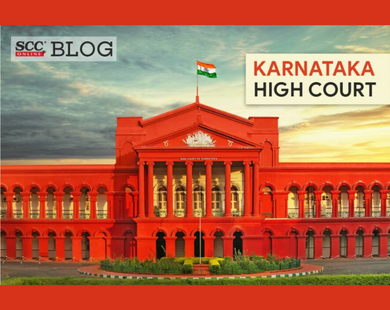Karnataka High Court: While deciding that whether the Notification declaring Popular Front of India (PFI) to be unlawful and bringing the Notification into effect immediately violates Section 3(3) of the Unlawful Activities Prevention Act, 1967; the Bench of M. Nagaprasanna, J., referring to the decisions of Mohd. Jafar v. Union of India, 1994 Supp (2) SCC 1 and Islamic Research Foundation v. Union of India, 2017 SCC OnLine Del 7489, which have emphasised on recording of reasons while imposing any reasonable restriction of the right under Art. 19(1)(c) of the Constitution, pointed out that the impugned Notification had stated the reasons for bringing the ban into effect immediately, therefore no interference is required from the High Court.
The Union of India via notification dated 28-09-2022, declared Popular Front of India (PFI) to be an unlawful organization and brought into force the notification with immediate effect.
Aggrieved by the afore-stated notification, the petitioner who claimed to be the PFI, stated that the organisation as registered under Karnataka Societies Registration Act, 1960, has been working for the empowerment of downtrodden sections of the Society. It was stated that issue of declaring PFI as unlawful organisation has been referred to the Tribunal constituted under Section 4 of UAPA, where it is a pending consideration. The petitioner approached the Court because the respondent decided to bring the Notification of declaration banning PFI, with immediate effect.
It was contended from the side of the petitioner that there was no warrant to bring the notification into operation with immediate effect; there are no separate reasons recorded for the said purpose. It was further argued that a fundamental right under Art. 19(4) of the Constitution cannot be taken away in a perfunctory manner without recording separate reasons for bringing into effect the Notification with immediate effect.
Per contraz, the Union of India argued that the notification itself contains the reasons. The notification is into two parts – one declaring it to be unlawful and the other bringing it into effect immediately. Therefore, no fault can be found in the notification on both counts, particularly for bringing into effect immediately.
Perusing the rival contentions, the Court firstly delved into the relevant provisions of the UAPA, namely Sections 3, 4, 7, 8, 10. Upon perusal of the impugned notification, the Court observed that the impugned notification noted the reasons stated therein, which stated that notification is being brought to effect immediately as – “PFI and its associates and affiliates have been involved in violent terrorist activity, with an intention to create a reign of terror in the country (…) if there is no immediate curb, then it is likely that they would continue to disturb public order undermining the constitutional setup of the country”.
Deliberating over the petitioner’s reliance on Art. 19, the Court noted that the purport of Art. 19(4) is that the Government is empowered to impose reasonable restrictions even on the fundamental right under Article 19(1)(c) if it would harm the sovereignty, integrity, public order or morality. The Court found that all this are stated in the reasons recorded in the impugned notification. Therefore, it is in compliance with Section 4(3) of the UAPA qua the right of any organization in its freedom to establish any organization or unit under Art. 19(1)(c) of the Constitution.
The Court referred to several decisions of various High Courts upon similar issue. However, the single Judge Bench’s deliberations noted the afore-stated decisions of Mohd. Jafar and Islamic Research Foundation.
In Mohd. Jafar case, the Supreme Court found that finds that no reasons were recorded in the Notification for imposing an immediate ban on ‘Jamaat-e-Islami Hind’ and bringing it into force with immediate effect. The Supreme Court while noting that Art. 19(4) requires that in the interest of sovereignty, integrity or public order or morality, the State can impose reasonable restriction on such right under Article 19 (1)(c), therefore, the same could not be taken away without recording reasons.
Later, the Delhi High Court in Islamic Research Foundation case considered an identical issue and applied the “reasoned notification” dictum laid down by the Supreme Court in Mohd. Jafar case.
With the afore-stated deliberations, the Court held that notification under challenge would indicate that reasons are present in the notification itself. Art. 19(1)(c) of the Constitution of India on which much emphasis has been laid on in the arguments, is also hedged with reasonable restrictions to be imposed in certain circumstances under Art. 19(4). The petition was hence dismissed.
[Nasir Pasha v. Union of India, 2022 SCC OnLine Kar 1594, decided on 30-11-2022]
Advocates who appeared in this case :
Jayakumar S. Patil, Advocate A/W Mohd. Tahir, Advocate for the Petitioner;
Tushar Mehta, SGI A/W M.B. Nargund, ASG and H. Shanthi Bhushan, DEPUTY SG for the Respondent.
*Sucheta Sarkar, Editorial Assistant has prepared this brief.







